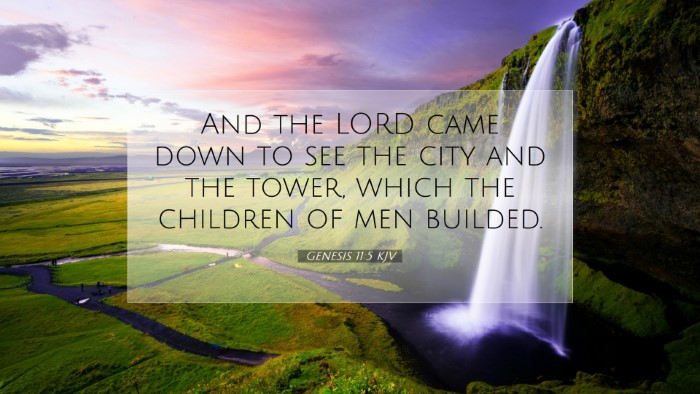Commentary on Genesis 11:5
Verse: "But the LORD came down to see the city and the tower which the children of men builded."
Introduction
This verse is a pivotal moment in the narrative of the Tower of Babel, where humanity's ambition and desire for self-exaltation stand in stark contrast to divine intentions. The use of "came down" suggests not only God’s awareness of human actions but also His sovereignty over creation. This commentary synthesizes insights from significant public domain commentaries such as those by Matthew Henry, Albert Barnes, and Adam Clarke.
Theological Insights
The act of God "coming down" is rich in theological significance, underscoring divine omniscience and omnipotence. It reflects God's oversight of humanity's endeavors and the limitations inherent in human pride.
- Divine Observation: Henry remarks that God’s descent suggests a divine investigation into human affairs, prompting theological reflection on God's engagement with the world.
- Human Ambition: Barnes elucidates the arrogance of humanity in attempting to build a tower to heaven as an act of defiance against God’s design.
- Symbol of Unity and Rebellion: Clarke notes that the tower symbolizes a misguided unity aimed at achieving greatness independent of divine guidance.
Literary Context
The account in Genesis 11:1-9 is critically situated following the flood narrative, where humanity is given a fresh start. The repetition of "one language" indicates a collective human effort that, while initially unifying, leads to a collective hubris.
- Unity in Rebellion: As Henry points out, the unity found in rebellion against God is inherently flawed and invites divine intervention.
- Contrast with Divine Command: Barnes emphasizes that the intentions behind the building of the tower were directly opposed to God’s command to "fill the earth" (Genesis 9:1).
God's Response
The Lord’s response—coming down to see—is a direct intervention that serves both as a judgment and a corrective measure for humanity's path. This is a critical point in biblical theology emphasizing God's role as sovereign judge.
- Judgment Through Confusion: Clarke discusses how the subsequent confusion of languages is not merely punitive but a reflection of God’s desire to redirect humanity towards His intended purposes.
- Preservation of Divine Order: Henry highlights that God’s actions are not just about punishment; they restore the order of creation that humanity attempts to subvert.
Implications for Faith and Practice
This narrative challenges contemporary readers, especially those in pastoral and theological contexts, to consider the implications of human ambition confronted by divine sovereignty.
- Encouragement of Humility: Reflecting on this text can lead to profound humility in the face of God’s plans, reminding scholars of the limitations of human intellect in achieving spiritual purposes.
- Unity in Diversity: The confusion of languages leads to a reflection on unity in diversity, an important principle echoing into the New Testament church (Acts 2), and speaks to the necessity of diverse expressions of faith under the sovereign hand of God.
- The Sovereignty of God: Ultimately, God's sovereignty remains intact, serving as a reminder of the futility of human effort when misaligned with divine intent.
Conclusion
Genesis 11:5 serves as a critical reminder of God's vigilance over human affairs and the inevitability of divine intervention in the face of human pride and ambition. This commentary merges insights from Matthew Henry, Albert Barnes, and Adam Clarke, providing a comprehensive theological reflection that is timeless in its relevance to pastoral, scholarly, and individual faith practices.
May this text inspire a renewed commitment to align human pursuits with divine purpose, emphasizing that true greatness is found not in self-exaltation but in humility before the Almighty.


